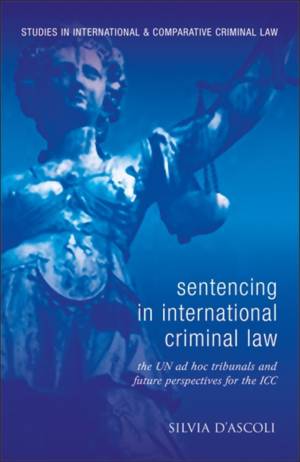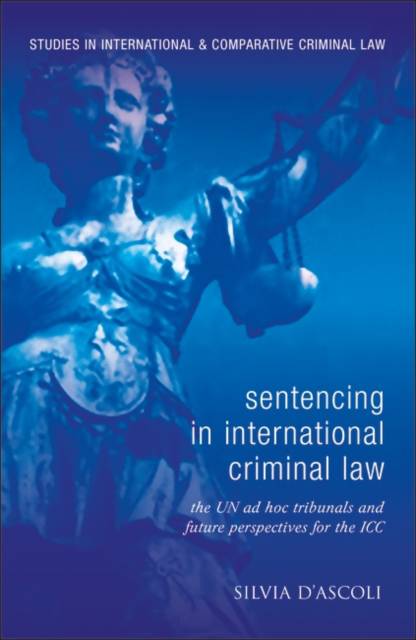
Bedankt voor het vertrouwen het afgelopen jaar! Om jou te bedanken bieden we GRATIS verzending (in België) aan op alles gedurende de hele maand januari.
- Afhalen na 1 uur in een winkel met voorraad
- In januari gratis thuislevering in België
- Ruim aanbod met 7 miljoen producten
Bedankt voor het vertrouwen het afgelopen jaar! Om jou te bedanken bieden we GRATIS verzending (in België) aan op alles gedurende de hele maand januari.
- Afhalen na 1 uur in een winkel met voorraad
- In januari gratis thuislevering in België
- Ruim aanbod met 7 miljoen producten
Zoeken
Sentencing in International Criminal Law
The Approach of the Two ad hoc Tribunals and Future Perspectives for the International Criminal Court
Silvia D'Ascoli
€ 198,95
+ 397 punten
Omschrijving
This book deals with sentencing in international criminal law, focusing on the approach of the UN ad hoc Tribunals for the former Yugoslavia (ICTY) and Rwanda (ICTR). In contrast to sentencing in domestic jurisdictions, and in spite of its growing importance, sentencing law is a part of international criminal law that is still 'under construction' and is unregulated in many aspects.
International sentencing law and practice is not yet defined by exact norms and principles and as yet there is no body of international principles concerning the determination of sentence, notwithstanding the huge volume of sentencing research and the extensive modern debate about sentencing principles. Moreover international judges receive very little guidance in sentencing matters: this contributes to inconsistencies and may increase the risk that similar cases will be sentenced in different ways.
One purpose of this book is to investigate and evaluate the process of international sentencing, especially as interpreted by the ICTY and the ICTR, and to suggest a more comprehensive and coherent system of guiding principles, which will foster the development of a law of sentencing for international criminal justice.
The book discusses the law and jurisprudence of the ad hoc Tribunals, and also presents an empirical analysis of influential factors and other data from ICTY and ICTR sentencing practice, thus offering quantitative support for the doctrinal analysis.
This publication is one of the first to be entirely devoted to the process of sentencing in international criminal justice. The book will thus be of great interest to practitioners, academics and students of the subject.
International sentencing law and practice is not yet defined by exact norms and principles and as yet there is no body of international principles concerning the determination of sentence, notwithstanding the huge volume of sentencing research and the extensive modern debate about sentencing principles. Moreover international judges receive very little guidance in sentencing matters: this contributes to inconsistencies and may increase the risk that similar cases will be sentenced in different ways.
One purpose of this book is to investigate and evaluate the process of international sentencing, especially as interpreted by the ICTY and the ICTR, and to suggest a more comprehensive and coherent system of guiding principles, which will foster the development of a law of sentencing for international criminal justice.
The book discusses the law and jurisprudence of the ad hoc Tribunals, and also presents an empirical analysis of influential factors and other data from ICTY and ICTR sentencing practice, thus offering quantitative support for the doctrinal analysis.
This publication is one of the first to be entirely devoted to the process of sentencing in international criminal justice. The book will thus be of great interest to practitioners, academics and students of the subject.
Specificaties
Betrokkenen
- Auteur(s):
- Uitgeverij:
Inhoud
- Aantal bladzijden:
- 422
- Taal:
- Engels
- Reeks:
- Reeksnummer:
- nr. 6
Eigenschappen
- Productcode (EAN):
- 9781849461160
- Verschijningsdatum:
- 1/04/2011
- Uitvoering:
- Hardcover
- Formaat:
- Genaaid
- Afmetingen:
- 156 mm x 234 mm
- Gewicht:
- 830 g

Alleen bij Standaard Boekhandel
+ 397 punten op je klantenkaart van Standaard Boekhandel
Beoordelingen
We publiceren alleen reviews die voldoen aan de voorwaarden voor reviews. Bekijk onze voorwaarden voor reviews.









